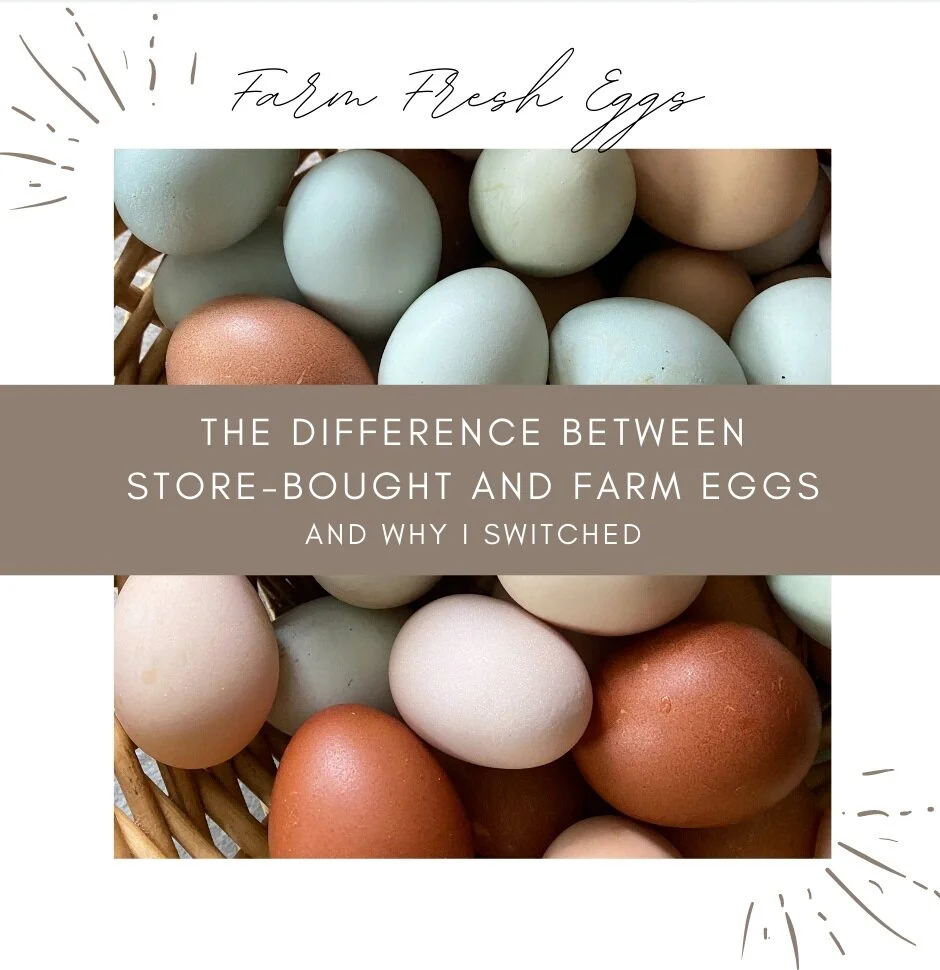The Difference Between Store-Bought Eggs and Farm Eggs
Our farming journey started with four hens on our urban farm. Sparkles, Flo Jo, Gretchen, and Sarah roamed under the citrus trees and enjoyed scraps from the kitchen. When we tasted the first of our fresh eggs we were hooked. The eggs tasted…different, in a good way. So what is the difference between store-bought eggs and farm eggs? It turns out lots!
Farm eggs taste better and are better for you.
Eggs from hens that roam freely, like at Sugar Hill Farmstead, are given the opportunity to eat a varied diet of seeds, bugs, and fresh grass. Pasture-raised chickens also get sunshine and exercise which have been proven to produce eggs that are higher in Calcium, Lutein, Vitamin A, Vitamin E, and Vitamin D. Not only do farm eggs have less saturated fat and cholesterol but they are higher in omega-3 fatty acids which are essential for your day-to-day functioning. Farm fresh eggs are higher in omega-3 fatty acids because chickens are able to forage for foods that are natural for a chicken to eat and are not found in the diets of caged hens that produce store-bought eggs. Unfortunately, many people in Hawaii suffer from vitamin D deficiency. Pasture-raised eggs are some of the best sources of vitamin D you can find! Store-bought eggs are usually laid by hens confined to cages or in large confined barns (that’s called cage-free) never seeing the sun, which means no Vitamin D in store-bought eggs.
When compared to store-bought eggs, local farm eggs are richer in color, yolk density, freshness, and shell thickness. Not only are you getting healthier eggs when you buy farm eggs, but there’s also the transparency in knowing where your food comes from.
Farm eggs are fresher
How long did those store-bought eggs take to get to the shelf? Well, it’s hard to pinpoint exactly. In Hawai‘i, it can take weeks to transport eggs from the facility to the store. It takes at least a week to go from the laying facility to the distributor, then loaded in a shipping container, another week at sea until it arrives in the islands. Then, it has to be unloaded at the store, we’re looking at sometimes two to three weeks of transit time for store-bought eggs to reach your home. Why would you want to eat old eggs?! Buying eggs from the farmer means you are getting fresher eggs that have traveled a fraction of the distance. The USDA says eggs keep, when refrigerated, for 4 weeks–s but homesteaders know you can keep eggs for a couple of months. Farm eggs straight from the farmer are always going to be fresher than store-bought eggs!
Farm eggs are better for chickens
One of the biggest benefits of buying farm-fresh eggs is that you’ll know exactly how the chickens were raised. Unfortunately, most industrial egg farms keep chickens in tiny cages for their entire lives. Hens are never given the opportunity to go outside and they barely have enough room to turn around! When you buy eggs from Sugar Hill Farmstead, and other local small farms, you’re supporting farmers who allow chickens to do what chickens do best–eat bugs, scratch in the dirt, and nibble on grass. Chickens are omnivores, they enjoy worms and bugs but they’ll also scramble to get the last morsel of tomato.
I switched to farm eggs because of the rich creamy flavor of the yolks, the high nutritional content and we loved seeing our chickens foraging in the yard. What happened next, well it’s clear people respected our approach and Sugar Hill Farmstead blossomed into the regenerative farm producing a diverse offering of pasture-raised meats, eggs, and organically grown vegetables. You can purchase our farm fresh eggs for pick-up in Honomu and Hilo through our online farm store.


